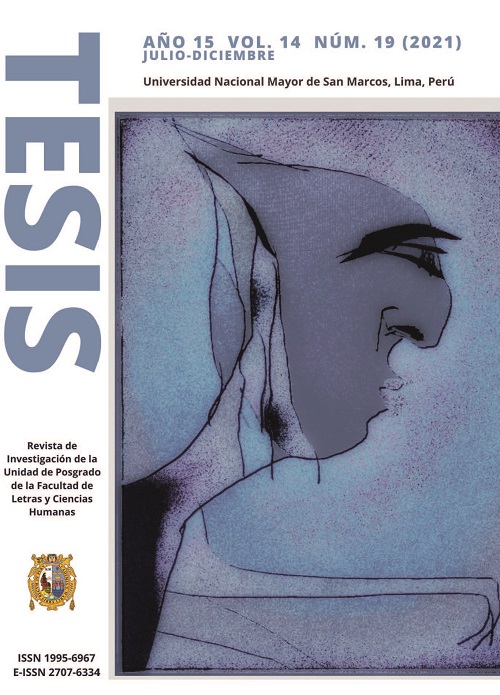The construction of reflexive-tolerant pragmatism and the turn to post-secular democracy
DOI:
https://doi.org/10.15381/tesis.v14i19.21282Keywords:
pragmatism, reflexive, religion, democracy, post secularAbstract
The evolution of pragmatist philosophy within American philosophy is approached in a propaedeutic way in relation to two central questions: the links between pragmatism and religion, and the primacy of democracy over philosophy, from which we seek to explain the shaping of post-secular democracy understood as a reflexive, cooperative and enthusiastic democracy, and also to raise the balance of the democratic experience from the will to believe in the individual and his or her possibilities.
References
Ames, R., Chen, Y. y Hershock, P. (eds.). (2021). Confucianism and deweyan pragmatism: Resources for a new geopolitics of interdependence. University of Hawai‘i Press.
Badura, C. y Kind, A. (Eds.). (2021). Epistemic uses of imagination. Routledge.
Barboza, M. (2018). Consideraciones acerca de la metamorfosis del mundo. Documentos de Trabajo, 113, 1-70. https://dialnet.unirioja.es/servlet/articulo?codigo=6552634
Barranco, B. (Coord.). (2019). AMLO y la tierra prometida. Penguin Random House. https://lasillarotarm.blob.core.windows.net/docs/2019/01/03/amloylatierra prometidasampler.pdf
Bauman, Z. (2017). Retrotopía. Paidós.
Beck, U. (2017). La metamorfosis del mundo. Paidós.
Botti, D. (2019). John Rawls and American pragmatism: Between engagement and avoidance. Lexington Books.
Calabrese, O. ([1987] 1999). La era neobarroca. (3.ª ed.). Cátedra.
Coles, R. (2016). Visionary pragmatism: radical and ecological democracy in neoliberal times. Duke University Press.
Coman, J. (20 de diciembre de 2020). John Rawls: can liberalism’s great philosopher come to the west’s rescue again? The Guardian. https://www.theguardian.com/inequality/2020/dec/20/john-rawls-can-liberalismsgreat-philosopher-come-to-the-wests-rescue-again
Edmundson, W. A. (2017). John Rawls: Reticent socialist. Cambridge University Press.
Frega, R. (2019). Pragmatism and the wide view of democracy. Palgrave Macmillan.
Giusti, M. (2011). El soñado bien, el mal presente: Rumores de la ética. Fondo Editorial de la Pontificia Universidad Católica del Perú.
Habermas, J. (2020). Auch eine Geschichte der Philosophie. Band I: Die okzidentale Konstellation von Glaube und Wissen. Suhrkamp.
Hamner, M. G. (2003). American pragmatism: A religious genealogy. Oxford University Press.
Hermoso, B. (10 de mayo de 2018). Entrevista: Jürgen Habermas: “¡Por Dios, nada de gobernantes filósofos!”. El País. https://elpais.com/elpais/2018/04/25/eps/1524679056_056165.html
Huang, Y. (2009). Rorty, Pragmatism and Confucianism: With responses by Richard Rorty. State University of New York Press.
Ingenieros, J. ([1917] 1956). Hacia una moral sin dogmas. Latino Americana.
Inverso, H. (2018). Fenomenología de lo inaparente. Prometeo.
Jay, M. (2016). Reason after its eclipse: On late critical theory. The University of Wisconsin Press.
Jay, M. (2008). La crisis de la experiencia en la era postsubjetiva. (2.ª ed.). Universidad Diego Portales.
Lachs, J. (2012). Stoic pragmatism. Indiana University Press.
Malachowski, A. (2013). Pragmatism. Cambridge University Press.
Maravall, J. ([1975] 2010). La cultura del barroco: Análisis de una estructura histórica. Ariel.
Méndez Pérez, F. J. (2012). Filosofía y contingencia en Richard Rorty. Eikasia, 44, 85-98. https://revistadefilosofia.org/44-05.pdf
Mitter, R. (15 de diciembre de 2018). Confucio: por qué el legado del gran sabio chino ha sido tan influyente durante milenios. BBC. https://www.bbc.com/mundo/noticias-46573005
Putnam, H. (1997). A half-century of philosophy, viewed from within. Daedalus, 126(1), 175-208. https://www.jstor.org/stable/pdf/20027414.pdf?casa_
Rawls, J. (2001). La justicia como equidad: una reformulación. Paidós Ibérica.
Rawls, J. ([1971] 2006). Teoría de la justicia. (6.ª reimp.). Fondo de Cultura Económica.
Renault, E. (2013). Dewey, Hook et Mao: quelques affinités entre marxisme et pragmatisme. Actuel Marx 2013/2, 54, pp. 138-157. DOI: 10.3917/amx.054.0137. https://www.cairn.info/revue-actuel-marx-2013-2-page-138.htm
Rorty, R. (2009). Una ética para laicos. Presentación de Gianni Vattimo. (1.ª reimp.). Katz.
Rorty, R. (2007). Philosophy as cultural politics: Philosophical Papers. Vol. IV. Cambridge University Press.
Rorty, R. ([2000] 2008). Persuadir es bueno: Un diálogo con Richard Rorty sobre filosofía y literatura, lo sublime y la razón ordenadora, la creación privada de sí mismo y el compromiso político. En R. Rorty, Filosofía y futuro (pp. 157-183). Gedisa.
Rorty, R. (1996). Objetividad, relativismo y verdad. Paidós.
Rosa, H. (2019). Resonance: A sociology of our relationship to the world. Polity Press. Salas Astraín, R. (2020). Justificación de las identidades culturales, teoría crítica intercultural y derechos humanos. En J. Faundes Peñafiel y S. Ramírez (Eds.), Derecho fundamental a la identidad cultural (pp. 33-53). Universidad Autónoma de Chile. https://repositorio.uautonoma.cl/bitstream/handle/20.500.12728/7894/derecho %20a%20la%20identidad%20cultural_%20jjfaundes_digital.pdf?sequence=1&is Allowed=y
Sennett, R. (2010). El artesano. (2.ª ed.). Anagrama.
Sloterdijk, P. ([2017] 2020). La herencia del Dios perdido. Siruela.
Sloterdijk, P. (7 de enero de 2019). La irreverencia del pensar. Biblioteca Nacional de Chile, Centro de Estudios Públicos. YouTube. [Archivo de video]. https://www.youtube.com/watch?v=d9n5nFB5dsQ
Trevor-Roper, H. (2009). La crisis del siglo XVII: Religión, reforma y cambio social. Katz.
United Nations General Assembly. (2018). Report of the special rapporteur on freedom of religion and belief. A/HRC/37/49. https://undocs.org/en/A/HRC/37/49
Vattimo, G. (2001). Diálogo con Nietzsche. Ensayos 1961-2000. Paidós.
Van Niekerk, A. (2013). Pragmatism and religion. En A. Malachowski, Pragmatism (pp. 300-323). Cambridge University Press.
Walzer, M. (2010). Pensar políticamente. Paidós.
Downloads
Published
Issue
Section
License
Copyright (c) 2021 Marco Léon Felipe Barboza Tello

This work is licensed under a Creative Commons Attribution 4.0 International License.
THE AUTHORS RETAIN THEIR RIGHTS:
(a) The authors retain their trademark and patent rights, and also on any process or procedure described in the article.
(b) The authors retain the right to share, copy, distribute, execute and publicly communicate the article published in Tesis (Lima) (in example, depositing the article in an institutional repository or publish it in a book), with recognition of its initial publication in the Tesis (Lima).
(c) The authors retain the right to make a later publication of their work, to use the article or any part of it (for example: a compilation of their works, notes for conferences, thesis, or for a book), provided that they indicate the source of publication (authors of the work, magazine, volume, number and date).






